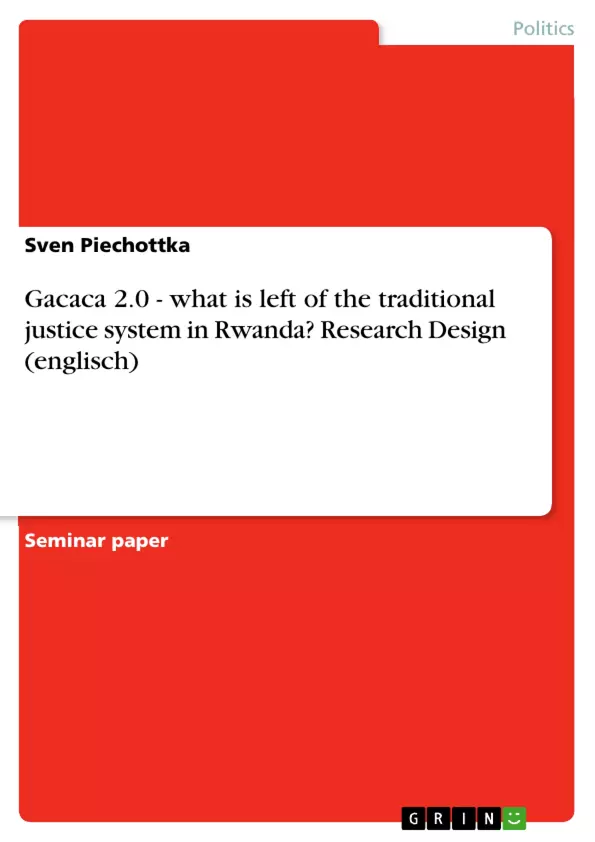The main thought of this research is to clarify the consequences of governmental (respectively colonial) influence for the legitimacy of Gacaca-courts in Rwanda. However, the outcomes are supposed to be general enough to assess the practicability of indigenous conflict resolution mechanisms in other African states as well. As a research design, the paper leaves the realisation of its methodological framework open.
Inhaltsverzeichnis (Table of Contents)
- Introduction
- Literature Review
- Conceptualization
- Research question and hypothesis
- Methodology
- Critical View
- Conclusion
Zielsetzung und Themenschwerpunkte (Objectives and Key Themes)
This research design aims to critically examine the role of Gacaca courts in Rwanda, specifically investigating the influence of the colonial state on their evolution and potential consequences for their legitimacy among the Rwandan population. The key themes explored include:- The history and development of Gacaca courts in Rwanda, both before and after colonial influence.
- The extent to which Gacaca courts are a genuine African tradition or an "invented tradition" influenced by colonial powers.
- The potential impact of governmental influence on the legitimacy of Gacaca courts among the Rwandan people.
- The implications of this analysis for the transferability of Gacaca-court models to other African countries.
Zusammenfassung der Kapitel (Chapter Summaries)
- Introduction: This chapter establishes the context of the research by highlighting the prevalence of unstable state structures in Sub-Saharan Africa, particularly in Rwanda following the 1994 genocide. It introduces the Gacaca courts as a potential solution for conflict resolution and reconciliation, but raises a critical question regarding their authenticity as a traditional African institution. The author proposes exploring the possibility of "invented tradition" in relation to Gacaca courts, emphasizing the importance of critically examining their legitimacy.
- Literature Review: This chapter provides a thorough overview of existing literature on the Rwandan genocide and the Gacaca courts. It examines the work of prominent researchers such as Ingelaere, Sarkin, Uvin, and Mironko, highlighting their perspectives on the historical context, procedures, and potential benefits and drawbacks of the Gacaca system. The chapter concludes by underscoring the limited research addressing the potential influence of colonial influence on Gacaca courts and their subsequent impact on public perception.
- Conceptualization: This chapter presents the theoretical framework for the research design, emphasizing the importance of a single case study approach to understand the Rwandan context. It lays out the specific research question and hypothesis, focusing on the measurable impact of the state on Gacaca traditions and its potential consequences for legitimacy within the Rwandan population. The chapter clarifies the research terminology, defining "local," "traditional," and "judicial" institutions as key elements for analysis.
Schlüsselwörter (Keywords)
This research project focuses on exploring the themes of Gacaca courts in Rwanda, indigenous traditions, colonial influence, state intervention, legitimacy, conflict resolution, and reconciliation. It seeks to analyze the complex interplay between traditional justice systems, modern state institutions, and public perception in a post-genocide context.
Ende der Leseprobe aus 10 Seiten
- nach oben
- Arbeit zitieren
- Sven Piechottka (Autor:in), 2013, Gacaca 2.0 - what is left of the traditional justice system in Rwanda? Research Design (englisch), München, GRIN Verlag, https://www.hausarbeiten.de/document/263336
Blick ins Buch


